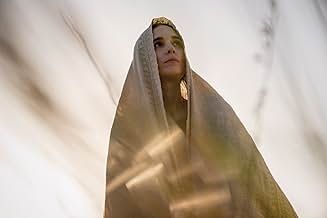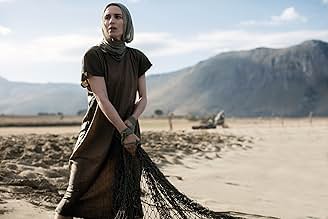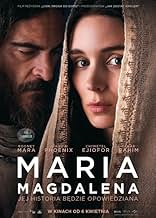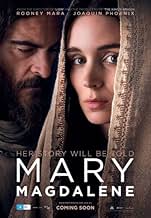NOTE IMDb
5,9/10
12 k
MA NOTE
Douze hommes ont entendu et diffusé le message de Jésus. Une seule femme l'a compris.Douze hommes ont entendu et diffusé le message de Jésus. Une seule femme l'a compris.Douze hommes ont entendu et diffusé le message de Jésus. Une seule femme l'a compris.
- Réalisation
- Scénario
- Casting principal
- Récompenses
- 2 victoires et 5 nominations au total
Avis à la une
Great acting, great perspective, great story.
It is strange that this idea could put a bad taste into someones mouth- that it is OUR responsibility to save the world - pretty much the opposite message of "sola fide" - the doctrine introduced by the Lutheran church that it is only through faith in the divinity of Jesus alone and not through works we achieve "salvation". Centuries of self-identified "Christians" with no real love of peace, truth or compassion at the helm of the West and look where it has gotten us... millions of Christians await Christ's return yet make no serious effort to live by Christ's teachings. That is the sore thumb and the tragedy of many of the efforts of modern evangelists
Ironically, a movie that is supposed to be about Mary Magdalene is the best cinematic telling of the Jesus story that I have seen - it takes care to communicate understandably how Jesus's real teachings could become skewed by disciples who had their own ideas about the way they thought things should be, or would prefer them to be. They helped create in their folly a system of belief which removes personal responsibility and promotes complacent self righteousness in apathy which seems so common today.
The message of personal responsibility is so crucial in these times when it feels like the world is speeding ever so quickly towards irreversible change - where that change is directed is up to us and if we are all sitting on our thumbs we may neglect our own responsibility and contributions in the matter. That someone could be made angry or put off by this idea seems incomprehensible to me
It is strange that this idea could put a bad taste into someones mouth- that it is OUR responsibility to save the world - pretty much the opposite message of "sola fide" - the doctrine introduced by the Lutheran church that it is only through faith in the divinity of Jesus alone and not through works we achieve "salvation". Centuries of self-identified "Christians" with no real love of peace, truth or compassion at the helm of the West and look where it has gotten us... millions of Christians await Christ's return yet make no serious effort to live by Christ's teachings. That is the sore thumb and the tragedy of many of the efforts of modern evangelists
Ironically, a movie that is supposed to be about Mary Magdalene is the best cinematic telling of the Jesus story that I have seen - it takes care to communicate understandably how Jesus's real teachings could become skewed by disciples who had their own ideas about the way they thought things should be, or would prefer them to be. They helped create in their folly a system of belief which removes personal responsibility and promotes complacent self righteousness in apathy which seems so common today.
The message of personal responsibility is so crucial in these times when it feels like the world is speeding ever so quickly towards irreversible change - where that change is directed is up to us and if we are all sitting on our thumbs we may neglect our own responsibility and contributions in the matter. That someone could be made angry or put off by this idea seems incomprehensible to me
This movie was very well done. It was a handsome production, the cinematography was very lovely, the acting was quite good and overall I would say it was a decent depiction of a tiny little chapter of the life of Christ. I wished they had spent a little more time developing his persona, his following, the conversion of the crowds and perhaps his miracles, something to give us a better feel for the evolution of this great saint. One of the issues I have with the depictions of saints is that it's very difficult for most actors to play a sense of joy, exaltation, omniscience and to convey the kind of consciousness these Prophets and great Saints experience. That aside, it was a reasonably good portrayal of a an extremely brief period of this great man's life and the ultimate finale.
The 6 stars are for the actors, the quality of the images and the bravery to make a movie about such a controversial subject. I am sadden for the fact that the plot has so many holes that even being a Christian (myself) didn't help. Christ journey during his last 3 years on earth was so immeasurably profound it changes lives to this day, 2000 years after. I was expecting that bringing the role of Mary Magdalene into light would make a fabulous complement. It didn't.
Mary Magdalene, according to the Gospels, was a follower of Jesus as one of his followers and was a witness to His crucifixion, burial, and resurrection. In Christian tradition she has frequently been described as a repentant prostitute, although there is no Biblical authority to support this theory or her identification with either the anonymous "sinful woman" who anoints Jesus's feet or with the equally anonymous "woman taken in adultery". There is also no evidence to support the theory occasionally put forward (e.g. in "The Da Vinci Code") that she and Jesus were married. Another assumption which has been made is that she was wealthy, and there is some Biblical support for this in that Luke refers to her supporting Jesus's ministry "out of her resources".
In this film, however, Mary Magdalene is a poor girl from Magdala on the Sea of Galilee. The real Magdala appears to have been a sizeable and prosperous town, but here it is depicted as a small and impoverished fishing village. She becomes a follower of Jesus, but her presence in His circle is not always welcomed by His male disciples. This is not simply a question of male chauvinism; there are also theological and ideological differences between Mary and the other disciples.
In the Gospels Judas Iscariot betrays Jesus for money, but it has become almost a cliché in New Testament biblical dramas to depict Judas as a Zealot, a freedom fighter hoping to liberate Judea from the control of the Roman Empire, an interpretation adopted in both "King of Kings" and "The Greatest Story Ever Told", even though there is no Biblical support for it. According to this interpretation Judas betrayed Jesus either in a bid to force Him to launch a Holy War against the Romans or out of disappointment that Jesus would not do so. This interpretation is followed in this film, except that here it is not just Judas who is a Zealot. All the other male disciples, especially Peter, hold similar views.
Mary Magdalene, however, is different. In a development again not found in the canonical Gospels (although it may derive some support from the non-canonical Gnostic Gospels) she is the only one who fully understands Jesus, that his is a message of peace and forgiveness, not of Holy War against the godless, and who helps to bring the male disciples (except Judas) round to this way of thinking.
There is nothing really wrong with Rooney Mara's performance in the main role, but she does not really stand out. The one outstanding performance comes from Joaquin Phoenix. Some might argue that Phoenix, aged 44 but looking considerably older behind that heavy beard, was too old to play Jesus, who died when He was only 33. Yet I think that there was probably a conscious decision on the part of the film-makers to get away from a young, handsome Jesus as portrayed by Robert Powell in "Jesus of Nazareth" or Jeffrey Hunter in "King of Kings" (aka "I Was a Teenage Jesus") and that the reasoning behind this decision was to downplay the idea that Mary's attraction to Jesus was sexual or romantic rather than spiritual. Phoenix gives us a deeply human Jesus, very different from traditional Christian ideas about the Second Person of the Trinity, co-equal and co-eternal with the Father. This is no charismatic orator or commanding religious leader but a humble carpenter's son turned itinerant preacher, a man whose appeal is grounded not in blazing rhetoric or miraculous powers but in his humility and his faith in God, a faith which remains unshaken despite moments of doubt. The film is very different to the traditional large-scale Biblical epic. It appears to have been made on a relatively small budget, lacking the elaborate sets and costumes and the large-scale set-piece scenes of something like "The Greatest Story...". It is austere in its visual style and the characters mostly wear plain homespun garments appropriate to their humble origins. It can at times be ponderous and slow-moving, yet there is a rugged simplicity and sincerity about it which means that it is able to bring Christianity to life in a way which more grandiose productions (and here I am thinking particularly of "The Greatest Story...") are not. 7/10
In this film, however, Mary Magdalene is a poor girl from Magdala on the Sea of Galilee. The real Magdala appears to have been a sizeable and prosperous town, but here it is depicted as a small and impoverished fishing village. She becomes a follower of Jesus, but her presence in His circle is not always welcomed by His male disciples. This is not simply a question of male chauvinism; there are also theological and ideological differences between Mary and the other disciples.
In the Gospels Judas Iscariot betrays Jesus for money, but it has become almost a cliché in New Testament biblical dramas to depict Judas as a Zealot, a freedom fighter hoping to liberate Judea from the control of the Roman Empire, an interpretation adopted in both "King of Kings" and "The Greatest Story Ever Told", even though there is no Biblical support for it. According to this interpretation Judas betrayed Jesus either in a bid to force Him to launch a Holy War against the Romans or out of disappointment that Jesus would not do so. This interpretation is followed in this film, except that here it is not just Judas who is a Zealot. All the other male disciples, especially Peter, hold similar views.
Mary Magdalene, however, is different. In a development again not found in the canonical Gospels (although it may derive some support from the non-canonical Gnostic Gospels) she is the only one who fully understands Jesus, that his is a message of peace and forgiveness, not of Holy War against the godless, and who helps to bring the male disciples (except Judas) round to this way of thinking.
There is nothing really wrong with Rooney Mara's performance in the main role, but she does not really stand out. The one outstanding performance comes from Joaquin Phoenix. Some might argue that Phoenix, aged 44 but looking considerably older behind that heavy beard, was too old to play Jesus, who died when He was only 33. Yet I think that there was probably a conscious decision on the part of the film-makers to get away from a young, handsome Jesus as portrayed by Robert Powell in "Jesus of Nazareth" or Jeffrey Hunter in "King of Kings" (aka "I Was a Teenage Jesus") and that the reasoning behind this decision was to downplay the idea that Mary's attraction to Jesus was sexual or romantic rather than spiritual. Phoenix gives us a deeply human Jesus, very different from traditional Christian ideas about the Second Person of the Trinity, co-equal and co-eternal with the Father. This is no charismatic orator or commanding religious leader but a humble carpenter's son turned itinerant preacher, a man whose appeal is grounded not in blazing rhetoric or miraculous powers but in his humility and his faith in God, a faith which remains unshaken despite moments of doubt. The film is very different to the traditional large-scale Biblical epic. It appears to have been made on a relatively small budget, lacking the elaborate sets and costumes and the large-scale set-piece scenes of something like "The Greatest Story...". It is austere in its visual style and the characters mostly wear plain homespun garments appropriate to their humble origins. It can at times be ponderous and slow-moving, yet there is a rugged simplicity and sincerity about it which means that it is able to bring Christianity to life in a way which more grandiose productions (and here I am thinking particularly of "The Greatest Story...") are not. 7/10
I know, I know its supposed to be about Mary, and it does a little bit of that, but it is also very much about how she sees Jesus. She sees him as a man carrying around the weight of the world on his shoulders, and she understands his true message when many miss it. In this way she serves a blank slate that we the audience can become.
She understands Jesus' true meaning behind the words in a way that only those outside of the story can. She as well as Jesus' mother both know that a gristly fate awaits him - just as we do.
I spent some time looking through the reviews, - many of the most negative reviews are arguing that it gets a lot wrong. So I wanted to argue a few of their points:
One reviewer says its wrong because Jesus didn't baptize Mary. The truth is we don't know. John 3:22 says Jesus spent some time baptizing, but then John 4:2 says Jesus wasn't baptizing, it was his disciples, but both of these moments are about Jesus' time in Judea - not Galilee, where Mary was likely baptized. It seems like in larger groups of baptisms, Jesus would have had his disciples share the work, and in a personal moment like baptizing Mary, (who many have suggested was funding these excursions), its likely in my mind that Jesus would have baptized her.
The same reviewer said that this film refutes that she had 7-demons cast out of her by Jesus (Luke 8:2). This is wrong by all accounts of Luke 8 that I can see. The Bible doesn't say Jesus cast the demons out. The Bible says that traveling with him included Mary who had had 7 demons cast out. The film shows her family attempting to cast demons out of her, and then Jesus sees her and says he sees no demons. This seems to fit well within the possibility of scripture.
It bothers me when people use scripture to try to refute or prove things. If you pull just a single line, you're missing the picture. And just because someone can quickly reference scripture, does not make them right.
Several said Jesus should appear in his early thirties. Again, we don't know. He was most likely between 33-36. The only mention in the Bible says he was younger than fifty.
Some people thought nobody looked semitic, but the Levant was one of the big melting pots, and there's not a lot of research on where all the white people were in 33 AD.
I agree they shouldn't have made Peter acting all righteous and jealous as he was in the Book of Thomas. Why must we tear someone down in order to lift another up? Also the trope of Angry Black Man... no thanks. Many called this a politically correct take on Jesus - and I'd argue that for this reason above that this was far from politically correct, and only reinforces bad stereotypes about gender and color.
Still one of my favorite films, hope this is useful for someone.
She understands Jesus' true meaning behind the words in a way that only those outside of the story can. She as well as Jesus' mother both know that a gristly fate awaits him - just as we do.
I spent some time looking through the reviews, - many of the most negative reviews are arguing that it gets a lot wrong. So I wanted to argue a few of their points:
One reviewer says its wrong because Jesus didn't baptize Mary. The truth is we don't know. John 3:22 says Jesus spent some time baptizing, but then John 4:2 says Jesus wasn't baptizing, it was his disciples, but both of these moments are about Jesus' time in Judea - not Galilee, where Mary was likely baptized. It seems like in larger groups of baptisms, Jesus would have had his disciples share the work, and in a personal moment like baptizing Mary, (who many have suggested was funding these excursions), its likely in my mind that Jesus would have baptized her.
The same reviewer said that this film refutes that she had 7-demons cast out of her by Jesus (Luke 8:2). This is wrong by all accounts of Luke 8 that I can see. The Bible doesn't say Jesus cast the demons out. The Bible says that traveling with him included Mary who had had 7 demons cast out. The film shows her family attempting to cast demons out of her, and then Jesus sees her and says he sees no demons. This seems to fit well within the possibility of scripture.
It bothers me when people use scripture to try to refute or prove things. If you pull just a single line, you're missing the picture. And just because someone can quickly reference scripture, does not make them right.
Several said Jesus should appear in his early thirties. Again, we don't know. He was most likely between 33-36. The only mention in the Bible says he was younger than fifty.
Some people thought nobody looked semitic, but the Levant was one of the big melting pots, and there's not a lot of research on where all the white people were in 33 AD.
I agree they shouldn't have made Peter acting all righteous and jealous as he was in the Book of Thomas. Why must we tear someone down in order to lift another up? Also the trope of Angry Black Man... no thanks. Many called this a politically correct take on Jesus - and I'd argue that for this reason above that this was far from politically correct, and only reinforces bad stereotypes about gender and color.
Still one of my favorite films, hope this is useful for someone.
Le saviez-vous
- AnecdotesRooney Mara and Joaquin Phoenix started dating during the production of this film.
- GaffesWhen Mary Magdalen leaves the lake after being baptized, her wet dress is slightly opaque and clinging. The straps to her bra or bikini top are noticeable.
- Citations
[first lines]
Mary Magdalene: And she asked him, "What will it be like? The kingdom?" And he said, "It is like a seed, a single grain of mustard seed, which a woman took and sowed in her garden. And it grew and it grew. And the birds of the air made nests in its branches."
- ConnexionsFeatured in Projector: Mary Magdalene (2018)
- Bandes originalesPsalm 121
Traditional, arranged by Sophia Brous
Performed by Tchéky Karyo
Meilleurs choix
Connectez-vous pour évaluer et suivre la liste de favoris afin de recevoir des recommandations personnalisées
- How long is Mary Magdalene?Alimenté par Alexa
Détails
- Date de sortie
- Pays d’origine
- Sites officiels
- Langues
- Aussi connu sous le nom de
- María Magdalena
- Lieux de tournage
- Sociétés de production
- Voir plus de crédits d'entreprise sur IMDbPro
Box-office
- Montant brut aux États-Unis et au Canada
- 124 741 $US
- Week-end de sortie aux États-Unis et au Canada
- 46 646 $US
- 14 avr. 2019
- Montant brut mondial
- 11 710 110 $US
- Durée
- 2h(120 min)
- Couleur
- Rapport de forme
- 2.20 : 1
Contribuer à cette page
Suggérer une modification ou ajouter du contenu manquant










































